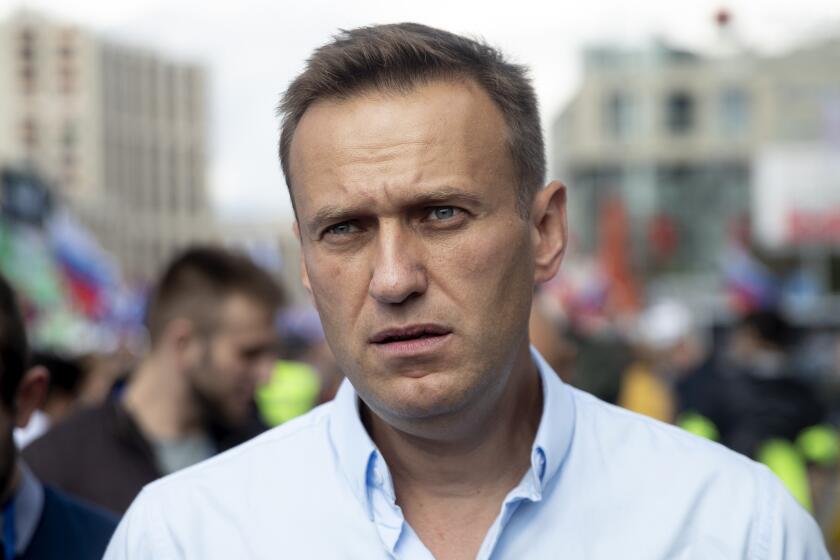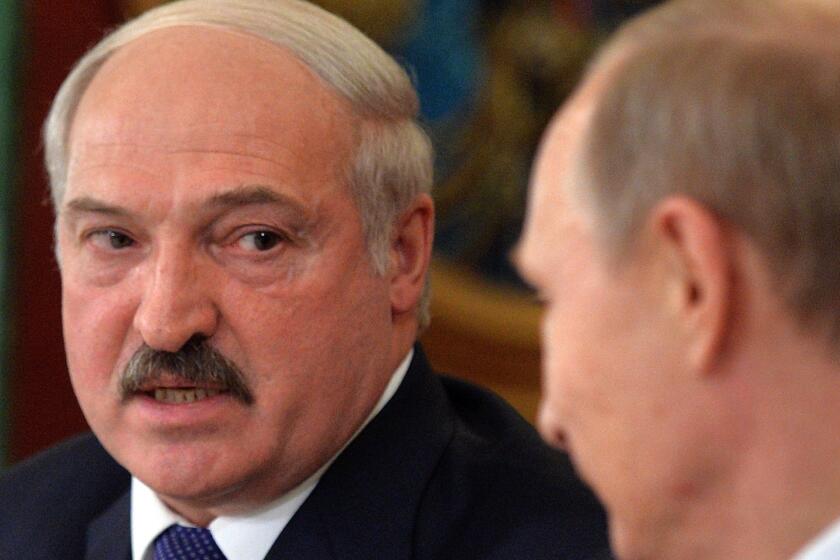Russia dismisses Alexei Navalny poisoning accusations as ‘empty noise’

- Share via
MOSCOW — The Kremlin on Tuesday rejected accusations of involvement in an alleged attack on Russian opposition politician Alexei Navalny, who remains comatose in a German hospital where tests have indicated that he was poisoned.
Navalny’s allies say the Kremlin is behind the illness of its most prominent critic, with some demanding an investigation into whether Russian President Vladimir Putin was involved.
“These accusations absolutely cannot be true and are, rather, an empty noise,” Kremlin spokesman Dmitry Peskov told reporters Tuesday. “We do not intend to take it seriously.”
Peskov said he saw no grounds for launching a criminal investigation into Navalny’s condition, saying that it could have been triggered by a variety of causes and that determining one should come first.
“If a substance [that caused the condition] is found, and if it is determined that it is poisoning, then there will be a reason for an investigation,” Peskov said.
Navalny, a politician and corruption investigator who is one of Putin’s fiercest critics, fell ill on a flight back to Moscow from Siberia on Thursday and was taken to a hospital in the city of Omsk after the plane made an emergency landing.
Past example shows that falling afoul of Putin can portend poison peril
Over the weekend he was transferred to the Charite hospital in Berlin, where doctors Monday said they have found indications of “cholinesterase inhibitors” in his system. Cholinesterase inhibitors act by blocking the breakdown of a key chemical in the body, acetycholine, which transmits signals between nerve cells. Navalny is being treated with the antidote atropine.
Navalny’s wife, Yulia Navalnaya, has been visiting her husband daily and made no comment to reporters as she arrived Tuesday.
German Chancellor Angela Merkel personally offered her country’s help in treating Navalny and has called for a full Russian investigation. France’s Foreign Ministry echoed Merkel’s sentiment, saying in a statement Tuesday that “it is essential that the Russian authorities carry out a swift and transparent investigation” into what it called a “criminal act perpetrated against a major player in Russian political life.”
U.S. Deputy Secretary of State Stephen Biegun, who visited Russia on Tuesday and met with Foreign Minister Sergey Lavrov, “expressed deep concern” about Navalny’s condition and “the impact on Russian civil society of reports of his poisoning,” Rebecca Ross, a spokeswoman at the U.S. Embassy in Moscow, said on Twitter.
News Alerts
Get breaking news, investigations, analysis and more signature journalism from the Los Angeles Times in your inbox.
You may occasionally receive promotional content from the Los Angeles Times.
Charite said Monday that Navalny had undergone extensive examination by a team of physicians and that “clinical findings indicate poisoning with a substance from the group of cholinesterase inhibitors.”
Cholinesterase inhibitors are a broad range of substances that are found in several drugs, but also in pesticides and nerve agents. The hospital said the specific substance to which Navalny was exposed isn’t yet known but that a further series of comprehensive tests had been started.
Navalny’s spokeswoman, Kira Yarmysh, said the Russian government’s reluctance to launch an investigation was expected.
“It was obvious that the crime would not be properly investigated and a culprit found. However, we all know perfectly well who that is,” Yarmysh tweeted Tuesday.
Experts have cautioned that it is far to early to draw any conclusions about how the agent may have entered Navalny’s system, but note that Novichok, the Soviet-era nerve agent used to poison former Russian spy Sergei Skripal and his daughter in Britain in 2018, was a cholinesterase inhibitor.
As EU rejects Belarus election result, the country’s beleaguered president looks to Moscow for backing.
“Cholinesterase inhibitor poisons can be given in many ways. They can be transported in many forms and are very potent,” said Dr. Richard Parsons, a senior lecturer in biochemical toxicology at King’s College London. “This is why they are a favored method of poisoning people.”
Dr. Thomas Hartung, of the Johns Hopkins Bloomberg School of Public Health in Maryland, said such substances are easy to detect, even days and weeks after the poisoning, and that “we will know soon which substance was used.”
“The Novichok nerve agents, which was used in the 2018 poisoning of the Russian double agent Skripal in England, also belong to this category of substance,” he said. “I said at the time that the Russians could have have just left a business card at the crime scene, because the substances can be so clearly traced.”
More to Read
Sign up for Essential California
The most important California stories and recommendations in your inbox every morning.
You may occasionally receive promotional content from the Los Angeles Times.












